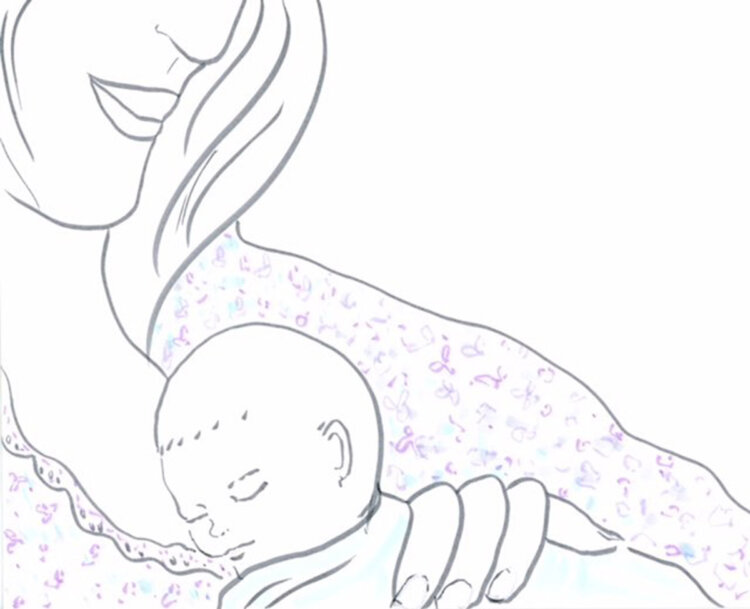
Every pregnant woman knows that she will have a gestational diabetes screen around the 26th week. She will down a syrupy sweet beverage and have her blood tested an hour later to see how her body processes the sugar in it. If she “fails” the test, she will undergo a more extensive yucky drink/blood draw test. If that one shows signs of diabetes, she will be treated through the rest of her pregnancy for her health and the health of her baby. The glucose screen is a rite of passage in pregnancy. Women compare notes about it, post on message boards, and offer each other camaraderie. If they are diagnosed, they swap recipes and tricks for managing the condition with exercise and diet. Six to eight percent of women will need treatment for diabetes during pregnancy.
More than twice as many pregnant women or new moms will develop a perinatal mood or anxiety disorder, the most common medical complication of pregnancy and childbirth. Screening for these conditions is not part of standard perinatal care (though major organizations like ACOG and the American Academy of Pediatrics recommend it). So, women often do not realize they are experiencing a medical complication for which there is effective treatment. Frequently they are ashamed or afraid to share how they are feeling. The majority suffer unnecessarily, putting their health and the health of their children in jeopardy.
For Maternal Mental Health Awareness Week we are going to get real, break it down, empower women and families, and start asking for better from the healthcare system that that is supposed to keep us, well, healthy.

The Myths
- We are just talking about depression. Experts now understand that women experience a range of symptoms and disorders that include anxiety, OCD, panic disorder, and post-traumatic stress disorder. And some of the most common symptoms—such as rage and anxiety—look nothing like the sad woman on the hospital brochure for PPD.
- We are just talking about the postpartum period. Half of all PMADs develop during pregnancy. And treating them in pregnancy lowers the chance that a woman will experience a disorder after pregnancy. Plus, a woman can experience these conditions any time in the 12 months after giving birth.
- This is your fault. Nope. This is a medical condition, and—while the cause of these conditions is not well understood—experts do know that the hormonal fluctuations that occur during and after pregnancy leave some women susceptible to developing them. And there are other risk factors—such as financial stress, poor social support, a history of trauma or a mood disorder or anxiety disorder—that can increase the likelihood that a woman will develop a PMAD. But anyone can develop one.
- You don’t love your baby. Women with PMADs are no different than any other mothers in how much they love their children. They just have a medical condition that means the beginning of motherhood is a much greater struggle than it needs to be.
- You just have to get through it. These conditions do not resolve on their own without treatment. You should have whatever support you need to feel strong, and there are risks to moms and babies when these conditions go untreated.
- The only treatment is drugs that you cannot take during pregnancy or breastfeeding. Actually, one of the most effective treatments for anxiety is cognitive behavioral therapy (CBT) and there are many other kinds of psychotherapy that are effective. There are also supplements and medications that can be used safely during pregnancy and breastfeeding under the care of an experienced clinician.
- You are a danger to your baby. You have probably heard stories of women who have harmed themselves or their babies. Though rare, these tragedies get a lot of media attention and often the media assumes a mother has postpartum depression. In fact, the majority of these rare events occur when a woman is suffering from untreated postpartum psychosis, an extremely rare but treatable psychiatric emergency in which a woman experiences a break from reality and may believe things that are not true or see and hear things that are not there.
The Facts
- Some 15 to 21 percent of women will have depression or anxiety during pregnancy.
- Eighty percent of women will have the “baby blues”—a period of mood swings, weepiness, and feeling overwhelmed in the first two weeks after giving birth. When symptoms go beyond two weeks there is a chance she is experiencing a perinatal mood or anxiety disorder (PMAD)
- One in seven women will experience a PMAD with symptoms that affect their day-to-day functioning anytime in the year after giving birth.
- About the same number of women who have adopted a baby will experience post-adoption depression.
- One to two in 1000 women will experience postpartum psychosis (which often shows up in the first four weeks after delivery). Very few of those women will harm themselves or their children. But there is a risk they could, so postpartum psychosis requires immediate medical care.
- All of these conditions have effective treatments that work surprisingly quickly. With the right care, you can feel so much better in a relatively short period of time.

What This Means
That becoming a mother is a stressful event. In fact, pregnancy itself is actually considered a “stressor” in the medical literature. Struggle is going to be part of the process. It’s like labor and delivery. It is a tremendous physical and emotional undertaking to bring a person into the world. We accept that physical pain and other medical complications can be part and parcel of making and birthing a human being. Why do we think our brains would get away Scott-free? That doesn’t make sense.
What We Need to Do
- Make screening for perinatal mood and anxiety disorders a routine part of obstetrical and pediatric medical training.
- Make screening for perinatal mood and anxiety disorders a routine part of obstetrical and pediatric care.
- Fight for legislation that mandates PMAD screening and funds expanded mental health care services.
- Support organizations that promote awareness, connect women and families to care, and advocate for improved medical care for mental health.
- Educate ourselves and the people around us about the symptoms of perinatal mood and anxiety disorders.
- Speak up when we are feeling badly.
- Ask pregnant women and new moms how they are feeling, listen when they answer, and connect them to knowledgeable help.
Imagine a world in which women can compare notes about their mood disorder screen, speak openly about how they are feeling, swap stories of treatment and other changes they made to feel better. A world in which it is understood that the emotional health of moms is an integral part of a healthy family and community, in which women are empowered to ask for help, and where they can find it when they do.
We can make that happen. You with me?
Kate Rope’s book Strong As a Mother, is out now! You can win your own copy now by entering your email address at the end of our article Mother’s Day books .


Grok Nation Comment Policy
We welcome thoughtful, grokky comments—keep your negativity and spam to yourself. Please read our Comment Policy before commenting.